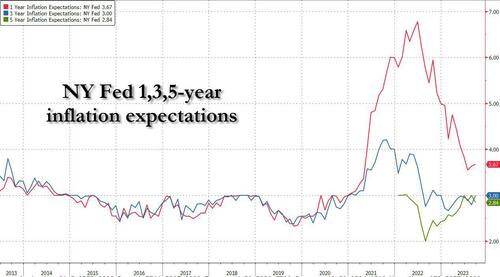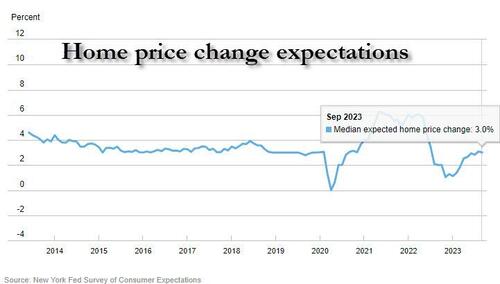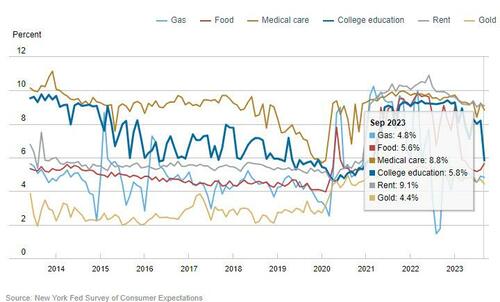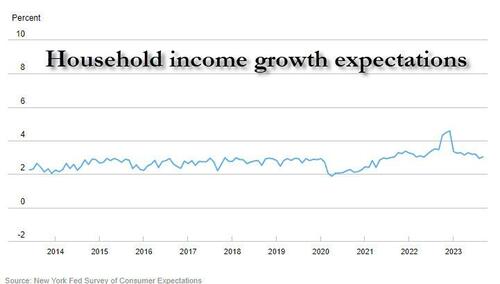

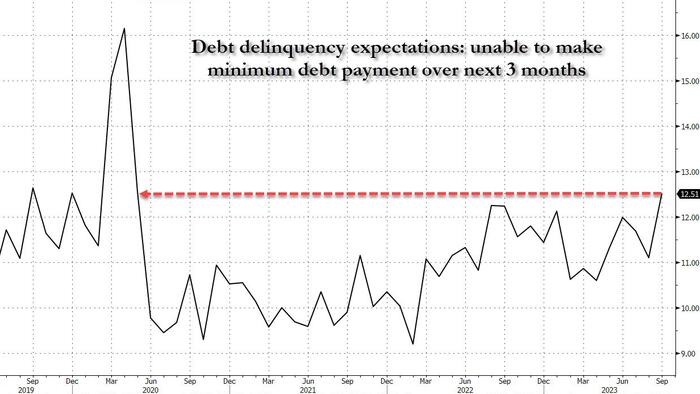
After several months of declines in the 1-Year inflation expectation as tracked by the NY Fed's monthly consumer survey, September saw the second consecutive increase in this series which traditionally is also a proxy for the price of oil (which recently hit a 2023 high before tumbling, before spiking again on the latest war in Israel), however this was offset by a small decline in 5 year inflation expectations, which traded places with the 3 year which in turn rose modestly. However, the most concerning observations was that despite a modest improvement in household income growth expectations, there was an unexpected spike in delinquency expectations as US household appear to have hit a brick wall on how much debt they can pay down in the immediate future
Here are the details: as shown in the chart below, inflation expectations at the one-year horizon were every so slightly higher at 3.67% in Sept. from the previous month’s 3.63%; three-year-ahead inflation expectations also reversed higher and after falling from 2.91% in July to 2.79% in August, they then bounced all the way to 3.00% in September. Finally, 5-year-ahead inflation expectations declined from 3.00% to 2.84%, the lowest since May 2023.
The report also noted that median inflation uncertainty (the uncertainty expressed regarding future inflation outcomes) increased slightly across all three horizons
Turning to median home price growth expectations, the survey found that after a perplexing jump of 0.3% to 3.1% in August, September saw a modest drop to 3.0%... which of course is just what the Fed wants to achieve, and suggests that the Fed's tightening plans may finally be taking a toll on the single, most important asset class for the US middle class. The decrease was more pronounced among respondents below the age of 40 and those who live in the South Census regions.
Next, turning to year-ahead commodity price expectations, there was a big drop in the cost of college education which decreased sharply to 5.8% from 8.2% , its largest one-month decrease since the onset of the survey in 2013 (good luck with that). Median year-ahead expected price changes declined by 0.1, 0.4 and 0.1 percentage point for the cost of gas (to 4.8%), medical care (to 8.8%) and rent (to 9.1%), respectively. In contrast, median year-ahead expected price changes for food increased by 0.3 percentage point (to 5.6%).
But while the latest reversal in the downward trend of inflation was troubling, this was offset in part by a similar reversal in the recent downward trend in household income growth expectations, which last month slumped to 2.9% - the lowest since July 2021 - and which in September rose modestly by 0.1% to 3.0%, remaining well below the series 12-month trailing average of 3.5% but at least halting the recent slide.
But while the latest uptick in income growth expectations was welcome, what was more troubling was the response to the question whether a respondent won't be able to make minimum debt payments over the next three months. As shown below, expectations for debt delinquencies surged to 12.5%, the highest since the covid lockdown in April 2020. The increase was largest for respondents below the age of 40, with some college education, and those with an annual household income below $50k.
In other words, with delinquency and charge-off rates already surging, the near-term is about to go from very bad to much worse.
Here are some other observations from the latest Ny Fed survey, first those dealing with household finance
And the labor market:
Putting it all together, while inflation expectations rose (tracking the price of oil in September) and household perceptions about their current financial situations and expectations for the future improved modestly, what was a flashing red alert was the sudden spike in delinquency expectations as US households can no longer afford to pay down their (record) debt and instead prepare to simply default.
More in the full report here.

